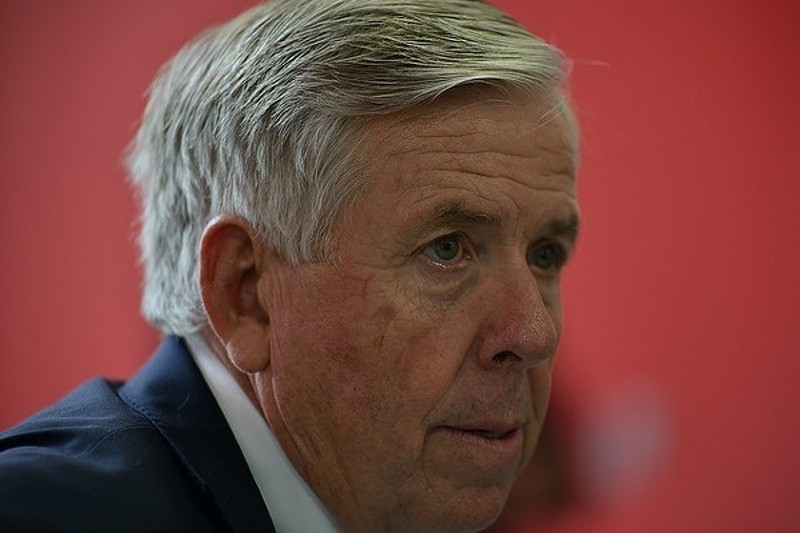Gov. Parson to End Federal Unemployment Aid to Out-of-Work Missourians
[
{
"name": "GPT - Leaderboard - Inline - Content",
"component": "41932919",
"insertPoint": "5th",
"startingPoint": "3",
"requiredCountToDisplay": "3",
"maxInsertions": 100
}
]
This story was originally published by the Missouri Independent.
Unemployed Missourians who are receiving federal payments to supplement their state benefits will lose that extra money after June 12, Gov. Mike Parson announced Tuesday.
The state will stop paying the $300 per week supplement and stop issuing payments under other federal unemployment relief programs in an effort to push reluctant workers back to the job market, Parson said.
“Continuing these programs only worsens the workforce issues we are currently facing,” Parson said at a news conference outside his Capitol Building office. “It is time we ended these programs that have incentivized people to stay out of the workforce.”
Parson is just the latest in a parade of GOP governors opting out of the federal unemployment supplement, following Alabama, Arkansas, Iowa, Mississippi, Montana, North Dakota, South Carolina and Tennessee.
Missouri’s unemployment rate was 4.2% in March and the labor force was 173,000 larger than when COVID-19-related unemployment peaked in April 2020. But there were 36,000 fewer people employed or looking for work in March than the pre-pandemic peak of 3.1 million in December 2019.
There are 221,000 job openings in the state, Parson said.
According to the St. Louis Federal Reserve Bank, there are 57,477 Missourians receiving unemployment benefits as of April 24.
“Despite our economy’s strong comeback, many business owners and employers across the state are still struggling, not because of COVID-19, but because they can’t find people to fill the jobs,” Parson said.
Along with supplements to the regular state unemployment program, Missourians who are out of work but who did not work in covered employment can receive relief payments that are equal to the combined state and federal benefits.
Missouri has a maximum state benefit of $320 a week. With federal supplemental payments, unemployed workers are currently receiving up to $620 a week.
Because Missouri’s unemployment is below 5 percent, unemployed Missourians are not eligible for extended benefits beyond the 20 weeks of payments allowed under state law. And Missouri in July became one of the first states to reimpose work search requirements, which some states are reinstating now.
Parson said he was acting to end the federal supplements to push people who have been unwilling to return to work back into jobs.
“We all know where the labor market is at and we are looking for people to go to work and it is time they went back to work,” Parson said.
Parson’s action was praised by Brad Jones, lobbyist for the National Federation of Independent Businesses. It will especially help with filling ranks at seasonal summer jobs, he said.
“We had a survey that showed 42 percent of our members have openings, which is the highest it’s been, ever,” Jones said.
Labor advocates, however, said Parson’s actions will do little to bring people back to the workforce.
“Missouri businesses that are complaining about not being able to recruit workers are only telling half the story,” says Richard von Glahn, policy director of Missouri Jobs with Justice. “Businesses that are having a hard time finding workers need to look at what they are offering in terms of pay and benefits to see if they are competitive in the labor market.”
Parson is hurting wage growth he touts as a contributor to the state’s strong economy, von Glahn said.
“This action is fiscally irresponsible and cruel,” said von Glahn. “Shredding the safety net doesn’t make families stronger, just more vulnerable to exploitation.
U.S. Rep. Cori Bush, D-St. Louis, pilloried Parson’s decision, saying the governor has “consistently failed to meet the needs of Missourians since this pandemic began.”
“Put simply, today’s decision by Gov. Parson is cruel,” Bush said in a prepared statement. “It will only serve to punish those most impacted by this pandemic and who need this relief the most. Too many lives have been devastated under the Governor’s watch. We cannot afford to lose one more life or livelihood because of his cruelty.”
When a person is receiving unemployment, they are required to be actively seeking a job and to have time available to do work offered by employers. But a person receiving benefits who, for example, is a restaurant manager who made $20 an hour, is not required to accept an offer to be a waiter at minimum wage.
And when an employer tells an employee they can return to work at their previous job, they are supposed to accept the work or benefits will end. Employers would routinely report people who would not return to work prior to the pandemic but that may have changed due to the pandemic, Jones said.
“How much of that is happening?” he said. “I am seriously wondering how much of that is happening.”
Other reactions fell on the same lines, with Democrats blasting Parson’s move and business groups praising it.
Missouri House Minority Leader Crystal Quade of Springfield said businesses will attract more workers when they increase wages.
“The notion that Missourians are refusing to work so they can temporarily collect $300 a week is an offensive right-wing myth,” Quade said.
The Missouri Chamber of Commerce issued a statement that Parson’s action will encourage people to work and aid the state’s economic recovery.
“Right now employers are deeply concerned about their ability to find the workers they need,” Dan Mehan, chamber president, said.
The federal programs require 30 days notice that the payments will end, which is why Parson set June 12 as the day of the last week that benefits will be paid. Missouri pays unemployment based on a Sunday to Saturday week.
Parson did not address the issue of overpayments from state and federal programs during his news conference.
U.S. Department of Labor guidelines issued last week that allow states to issue blanket waivers for overpayments made by mistake.
“In many cases, individuals received payments for which they may not have been eligible through no fault of their own,” Principal Deputy Assistant Secretary for Employment and Training Suzi LeVine added. “The guidance issued today by the U.S. Department of Labor will help states address this important issue, providing them with greater flexibility to forgo recovery of improper payments from honest workers who continue to struggle and direction in handling cases where real fraud exists.”
The Missouri House in March passed legislation directing the Department of Labor and Industrial Relations to grant waivers in cases where mistakes in processing or calculating benefits resulted in overpayments.
The legislation has been amended in the Senate to allow waivers for overpayments from the state unemployment fund and the budget passed last week includes $48 million to cover the cost of the state waivers.
Lawmakers have until Friday to finish work on legislation.






